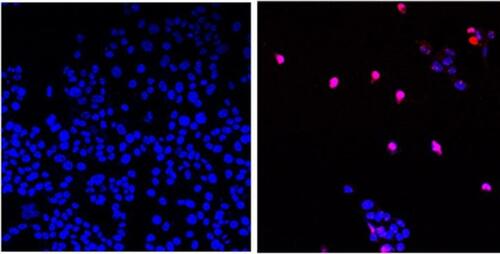
Authored by Mimi Nguyen Ly via The Epoch Times (emphasis ours),
A group of U.S. researchers has developed a new “cancer-killing pill” that could target and kill solid tumors while leaving healthy cells unharmed.

That’s according to their preclinical research findings, published Aug. 1 in the Cell Chemical Biology journal.
Titled “Small Molecule Targeting of Transcription-Replication Conflict for Selective Chemotherapy,” the study found that a drug the researchers developed was able to selectively disrupt DNA replication and repair in cancer cells.
The drug is called AOH1996. It was named after Anna Olivia Healey, who was born in 1996 and died of a rare form of cancer called neuroblastoma when she was 9 years old.
Linda Malkas, a senior author of the new study based at the City of Hope, has been developing the drug over the past two decades.
City of Hope is a private, non-profit clinical research center, hospital, and graduate school in Duarte, California. It’s one of the largest cancer research and treatment organizations in the United States.
According to a press release from City of Hope, the AOH1996 “appears to annihilate all solid tumors.”
Now that research has demonstrated promising results in cell and animal models, the new drug is being tested in humans in a Phase 1 clinical trial, Ms. Malkas said in a statement.
Unique Mechanism
The preclinical study explains how AOH1996 targets a cancerous version of the protein, called proliferating cell nuclear antigen (PCNA).
The cancerous variant of PCNA “is critical in DNA replication and repair” of all cancerous tumors, but the new drug AOH1996 inhibits PCNA, the City of Hope noted in its release.
“Data suggests PCNA is uniquely altered in cancer cells, and this fact allowed us to design a drug that targeted only the form of PCNA in cancer cells,” Ms. Malkas said.
“PCNA is like a major airline terminal hub containing multiple plane gates,” she explained. “Our cancer-killing pill [AOH1996] is like a snowstorm that closes a key airline hub, shutting down all flights in and out only in planes carrying cancer cells.”
Given orally at a certain dose, AOH1996 “suppresses tumor growth but causes no discernable side effect,” authors wrote in the study.
Most other targeted cancer therapies focus on a single pathway, which allows cancer cells to mutate and eventually become resistant to the therapy, Ms. Malkas noted. The unique mechanism of AOH1996 that enables it to target the mutated versions of PCNA sets it apart from other currently available therapies.
Ms. Malkas said results “have been promising” and they suggest that AOH1996 “can suppress tumor growth as a monotherapy or combination treatment in cell and animal models without resulting in toxicity.”
Further Studies Ahead
PCNA was once thought to be too challenging for targeted therapy.
“No one has ever targeted PCNA as a therapeutic because it was viewed as ‘undruggable,’ but clearly City of Hope was able to develop an investigational medicine for a challenging protein target,” lead author of the study, Long Gu, said in a statement.
Read more here...
Authored by Mimi Nguyen Ly via The Epoch Times (emphasis ours),
A group of U.S. researchers has developed a new “cancer-killing pill” that could target and kill solid tumors while leaving healthy cells unharmed.

That’s according to their preclinical research findings, published Aug. 1 in the Cell Chemical Biology journal.
Titled “Small Molecule Targeting of Transcription-Replication Conflict for Selective Chemotherapy,” the study found that a drug the researchers developed was able to selectively disrupt DNA replication and repair in cancer cells.
The drug is called AOH1996. It was named after Anna Olivia Healey, who was born in 1996 and died of a rare form of cancer called neuroblastoma when she was 9 years old.
Linda Malkas, a senior author of the new study based at the City of Hope, has been developing the drug over the past two decades.
City of Hope is a private, non-profit clinical research center, hospital, and graduate school in Duarte, California. It’s one of the largest cancer research and treatment organizations in the United States.
According to a press release from City of Hope, the AOH1996 “appears to annihilate all solid tumors.”
Now that research has demonstrated promising results in cell and animal models, the new drug is being tested in humans in a Phase 1 clinical trial, Ms. Malkas said in a statement.
Unique Mechanism
The preclinical study explains how AOH1996 targets a cancerous version of the protein, called proliferating cell nuclear antigen (PCNA).
The cancerous variant of PCNA “is critical in DNA replication and repair” of all cancerous tumors, but the new drug AOH1996 inhibits PCNA, the City of Hope noted in its release.
“Data suggests PCNA is uniquely altered in cancer cells, and this fact allowed us to design a drug that targeted only the form of PCNA in cancer cells,” Ms. Malkas said.
“PCNA is like a major airline terminal hub containing multiple plane gates,” she explained. “Our cancer-killing pill [AOH1996] is like a snowstorm that closes a key airline hub, shutting down all flights in and out only in planes carrying cancer cells.”
Given orally at a certain dose, AOH1996 “suppresses tumor growth but causes no discernable side effect,” authors wrote in the study.
Most other targeted cancer therapies focus on a single pathway, which allows cancer cells to mutate and eventually become resistant to the therapy, Ms. Malkas noted. The unique mechanism of AOH1996 that enables it to target the mutated versions of PCNA sets it apart from other currently available therapies.
Ms. Malkas said results “have been promising” and they suggest that AOH1996 “can suppress tumor growth as a monotherapy or combination treatment in cell and animal models without resulting in toxicity.”
Further Studies Ahead
PCNA was once thought to be too challenging for targeted therapy.
“No one has ever targeted PCNA as a therapeutic because it was viewed as ‘undruggable,’ but clearly City of Hope was able to develop an investigational medicine for a challenging protein target,” lead author of the study, Long Gu, said in a statement.
Read more here…
Loading…





